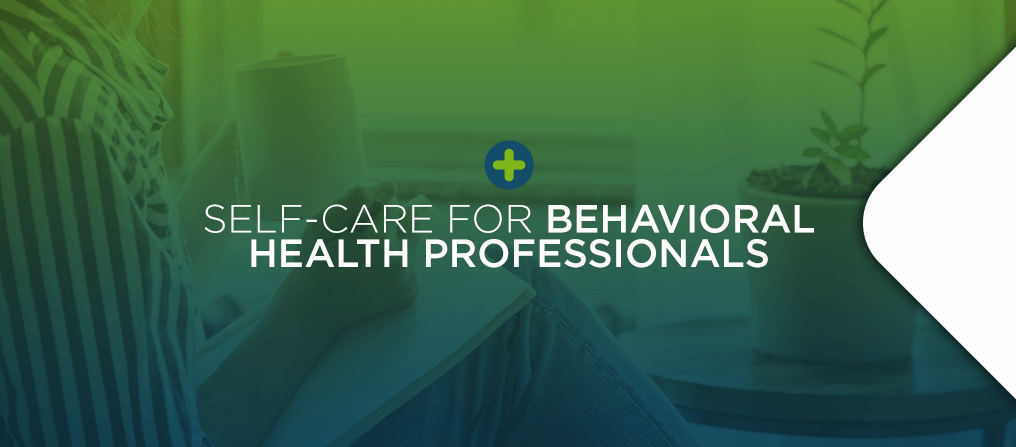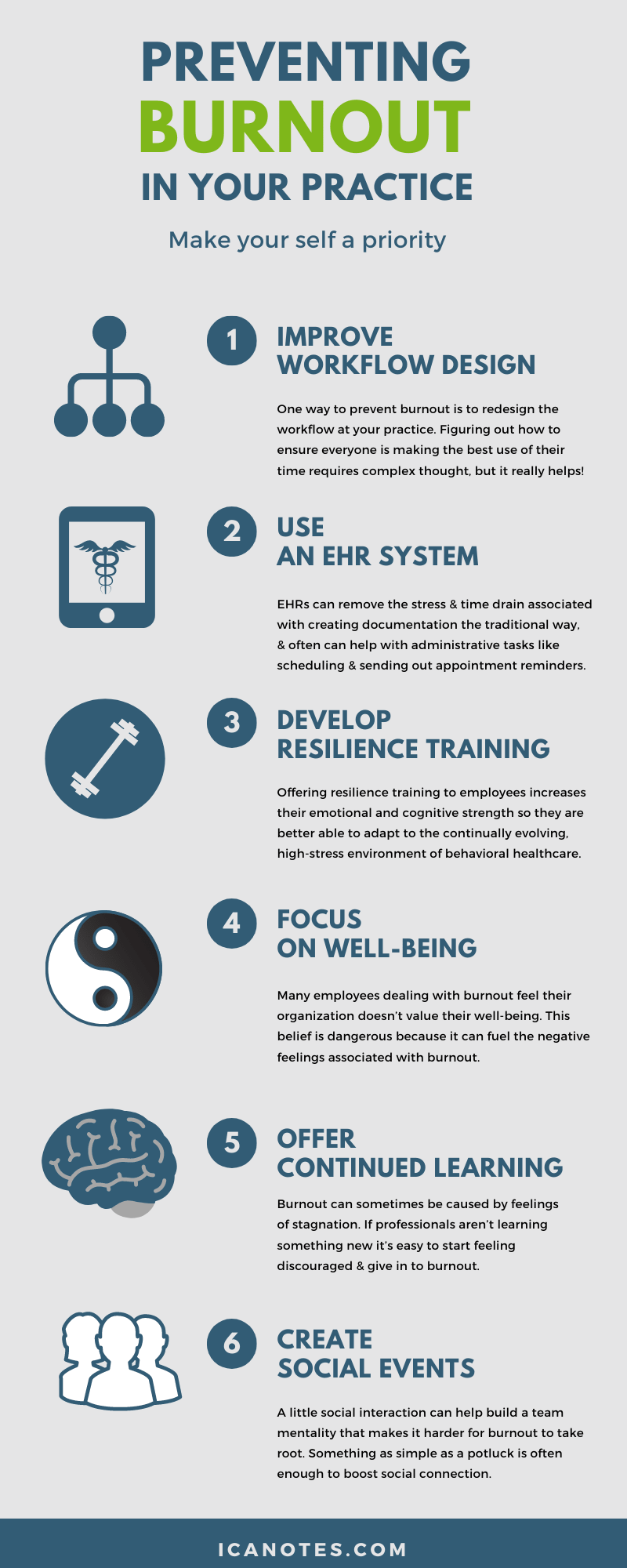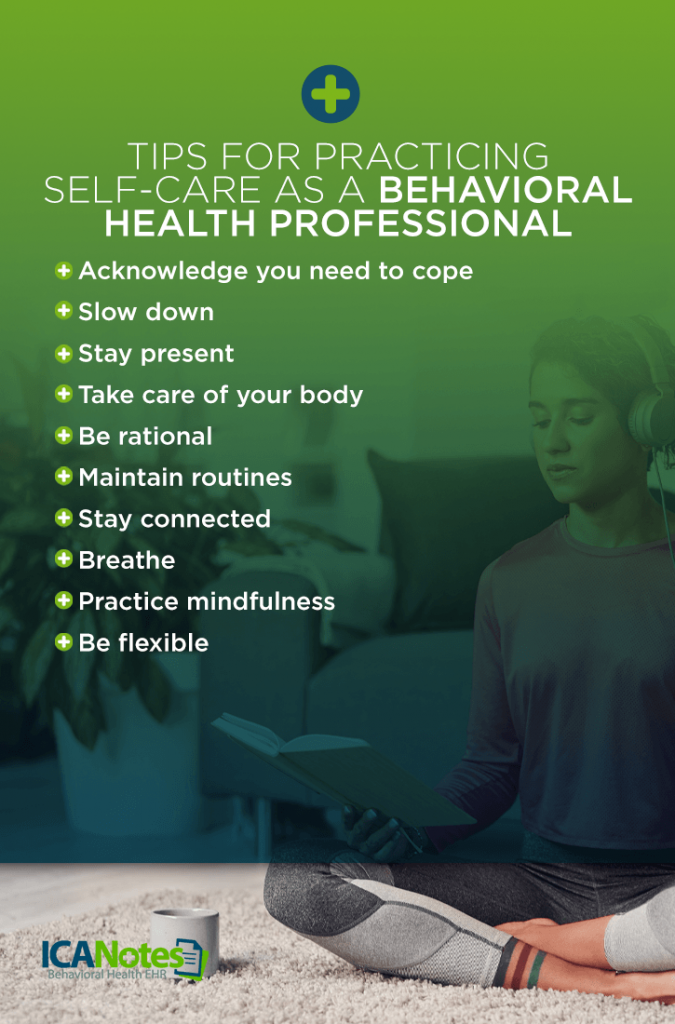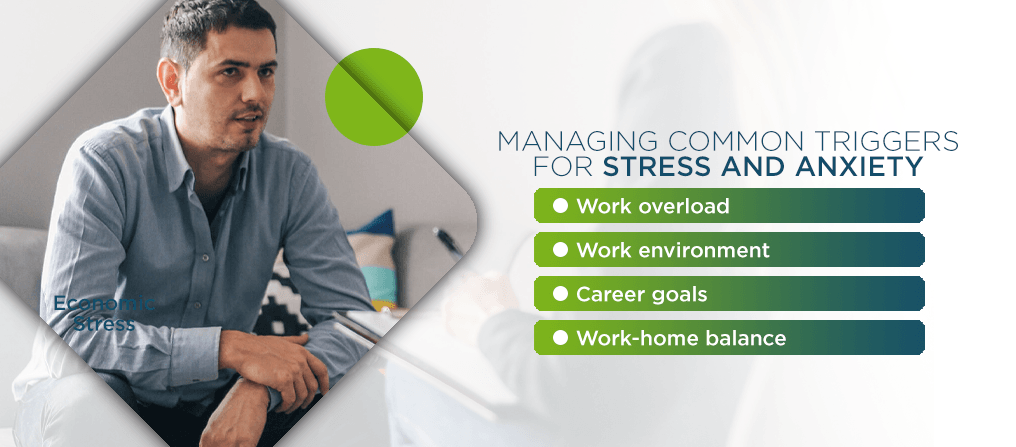Self-Care for Behavioral Health Professionals
Behavioral health professionals dedicate their careers to helping others. They help their patients recognize damaging behaviors and thought patterns, manage stress and live healthier lives. But, that does not mean counselors are any less vulnerable to stress. About half of mental health professionals report experiencing some level of burnout.
Now, during a global pandemic, levels of uncertainty, anxiety and burnout are increasing for many people. Behavioral health professionals are an excellent resource for people struggling with these feelings, but therapists need to take time to care for themselves to do their jobs and maintain their mental health. Take a moment to pause and consider the importance of self-care for healthcare professionals.
Table of Contents
- Care for Yourself to Care for Others
- Are You Experiencing Burnout?
- Tips for Practicing Self-Care as a Behavioral Health Professional
- Managing Common Triggers for Stress and Anxiety
- Beat the Burnout With Tools From ICANotes
Care for Yourself to Care for Others
If you do not attend to your needs, it becomes nearly impossible to care for others. When your physical or mental well-being or both is under strain, it will compromise your ability to fulfill your responsibilities as a behavioral health professional. Self-care, which you likely encourage your patients to embrace, is about attending to your needs so you can live a balanced life. You don't have to put your health on the back burner. If you do, you may find yourself struggling to do your job.
How can you find that balance? You likely have heard of the theory of motivation: Maslow's Hierarchy of Needs. Though experts still debate the theory, it can help to keep the five levels of that hierarchy in mind when considering your well-being. You'll typically see Maslow's Hierarchy displayed in a pyramid shape.
- Biological needs: Food, water and sleep make up the base of the pyramid. If you lack any of these, each day is likely a major struggle. Check in with yourself. Are you maintaining a healthy diet? Are you staying hydrated? Are you getting enough sleep?
- Safety: Security is vital. Do you feel safe at work and at home? Have you taken the appropriate steps to protect your family from harm?
- Relationships: Our relationships are an integral part of our lives. Our spouses, partners, children, parents, siblings, friends and co-workers can give us a sense of belonging. Do you feel connected to the people in your life? Are those relationships healthy?
- Self-esteem: How we think of ourselves is an integral part of our overall health and happiness. But, this level of the pyramid is more complicated than addressing a basic need, like sleep. If you have negative feelings about yourself, something nearly everyone struggles with throughout their lives, it can seep into other parts of your life. If you don't value yourself and your skills, how can you do your job effectively?
- Self-fulfillment: The tip of the pyramid is self-fulfillment. This element of the theory is about reaching your full potential. Pursuing creative outlets outside work is one way to work on this area.
Whether or not you fully accept Maslow's Hierarchy as a theory, it does say something powerful about self-care. You are welcome to create a hierarchy specific to your needs, but one thing is sure. You do have a life outside work, and taking care of yourself contributes to your overall health, mentally and physically. When you feel well, you have the energy and resources to help care for others.
Upcoming Webinar
Understanding Vicarious Trauma, Compassion Fatigue, and Burnout
Tuesday, December 12, 2023 | 1:00 PM EST
Are you a dedicated mental health clinician looking to enhance your self-care, better serve your clients, and cultivate mindful attention to your needs? Join us for a transformative webinar led by Bea Sanders, LCSW, a passionate licensed clinical social worker from Northwest Arkansas.
Webinar Highlights
- Exploring Emotional Toll
- Differentiating Challenges
- Prevalence and Impact
- Effective Strategies
- Free Resource Guide
This webinar is free of charge and promises to be a game-changer for your professional and personal growth. Secure your spot today by registering below:
Are You Experiencing Burnout?
Burnout can affect anyone at any age or time. This state of constant pressure, characterized by a lack of mental and physical energy, can be hard to recognize in yourself. After all, you are accustomed to dealing with problems, compartmentalizing and accomplishing essential tasks. With an ongoing global pandemic and the constant anxiety of an uncertain future, burnout during this time would be no surprise. Are you suffering from this condition?
It might be evident that you're feeling burned out and unable to manage all your responsibilities, though you keep pushing through each day. Or, it could be more subtle. You might think you're doing OK because you don't take time to think otherwise. Ask yourself:
- Are you tired every day?
- Do you feel anxious or upset about going to work most days?
- Do you always feel overwhelmed?
- Does work feel pointless?
- Are you regularly doubting yourself and your abilities?
- Do you find yourself experiencing frequent headaches and body aches?
- Are you frequently procrastinating?
- Are you struggling with feelings of cynicism?
- Are you turning to unhealthy coping mechanisms?
Answering yes to any of these questions can indicate burnout. Set aside some time to honestly assess your feelings and determine whether you are burned out or heading in that direction. Burnout can be a challenging cycle to break. First, you need to acknowledge that you are struggling.
Burnout affects you and your clients. If you're exhausted and emotionally drained every day, burnout could lead to consequences like compassion fatigue and poor clinical decision-making. If you are experiencing burnout, be kind to yourself, and remember self-care for psychologists is just as essential as self-care for patients.
Tips for Practicing Self-Care as a Behavioral Health Professional
You probably know every self-care trick in the book when it comes to talking with your patients, but it can be hard to take a step back and recognize how useful self-care for healthcare workers can be, too. As a behavioral health professional, remind yourself of the following.
- Acknowledge you need to cope: The first step in breaking free of burnout is understanding your feelings. Instead of telling yourself that you can keep pushing through, recognize that you need to set aside time for self-care. This acknowledgment can be as simple as taking a mental note. Or, you can talk to a trusted friend or family member about how you feel.
- Slow down: A feeling of the constant grind is a familiar part of burnout. You force yourself to go, go, go, even if it is draining. Hit the pause button. Slow down. Examine your priorities and allow yourself to stop, even if only for a short while. Slowing down can help you recognize the symptoms of burnout and what changes to make.
- Stay present: Constantly worrying about the future and ruminating on the past can play a role in burnout. If your mind is always reaching backward or forward, it can cause you to neglect the present. Try to recognize when your mind wanders in unproductive ways and gently remind yourself to return to the present.
- Take care of your body: Self-care for essential workers is about both mental and physical well-being. If we neglect one, the other will probably suffer as well. Remember the fundamentals: Eat a healthy diet, stay hydrated and embrace a regular sleep schedule. We often think of burnout as purely mental exhaustion, but it is surprising how much of a physical toll it can take.
- Be rational: Behavioral healthcare professionals help their patients recognize and unravel irrational thoughts. Try to acknowledge your irrational thoughts and break the pattern. It takes time and practice, but the continuous effort to ground your thoughts is a vital part of self-care.
- Maintain routines: Routines can be part of a healthy lifestyle. You likely have a work schedule to stick to, but you can incorporate routine in other aspects of your life. Try starting the day with a form of exercise. End the day with a cup of tea and a book. Try to create a regular sleep schedule. Find small things to incorporate into your daily practice that help support your well-being.
- Stay connected: Are you the type of person to lose yourself in your work? There's always so much to do, and so many people who need your help. But, a vital element of self-care is maintaining your social bonds. Stay connected with family and friends. Lean on them as your support system. These kinds of connections help build resiliency and provide you with valuable tools to detangle and manage stress in your life.
- Breathe: Breathing comes naturally, but that doesn't mean you shouldn't practice it. Breathing exercises can help you manage and reduce anxiety. Take a few minutes out of your day for deep breathing with rhythmic counting tied to the breath. You can complete this simple exercise in the middle of your workday, or you can make it part of your time at home.
- Practice mindfulness: Your breathing exercises can be a part of a more extensive effort to practice mindfulness in your life. Mindfulness is a type of meditation that guides you toward living in the present moment. There's no one right way to practice mindfulness. It's more about putting in the effort. Try mindfulness while walking, sitting or doing household tasks. Building this practice into your routine can help reduce the stress and anxiety that feeds into burnout.
- Be flexible: Of all the self-care activities for counselors, this one tip may be the most crucial. We make routines. We do our best to juggle work and family. Still, the unexpected happens. Try to remember to stay flexible, especially in the face of stress. Take a moment to breathe or complete a mindfulness exercise before you tackle the next disruption.
Managing Common Triggers for Stress and Anxiety
Stress and anxiety in day-to-day life are unavoidable and likely heightened during the pandemic. You are always going to need to handle circumstances outside your control. While you cannot eliminate stress, you can recognize its root cause, find ways to reduce stress at its source and modulate how you respond.
Common triggers for stress and anxiety include the following.
- Work overload: The feeling of constant scrambling to keep up a mounting pile of work is a recipe for burnout. You may not be able to change your caseload or reduce your work hours, but you can find ways to improve efficiency and make your job a little smoother. For example, ICANotes can help clinicians manage the burden of documentation. Fast, accurate documentation paves the way for faster reimbursement. Less worry about paperwork and getting paid can help declutter your workday and allow you to focus more on patient care.
- Work environment: Your environment plays a significant role in how you feel about the work you do every day. Are you comfortable and productive at work? Or, do your surroundings feel chaotic and stressful? Not everything about your work environment is within your control, but you can make some positive changes. You can organize your workspace. Clutter may seem like no big deal, but it can contribute to stress and anxiety. You can also build time into your work routine for small breaks to practice mindfulness. Set a calendar reminder to take a few minutes for a deep breathing exercise or a body scan. Disconnecting, even briefly, from your work can help you manage your stress during the workday.
- Career goals: Pursuing and achieving career goals is an essential part of feeling fulfilled. If you feel like the bulk of your work is not contributing to these goals, you can quickly become disillusioned and burned out. Set aside time to evaluate your goals and ask yourself how you can progress toward them in manageable steps. Can you leverage tools, like ICANotes, to reduce the amount of time you spend on documentation? Can you pursue career development initiatives, such as continuing education sessions? Try to find ways to keep your goals in your sightline while you manage your day-to-day responsibilities.
- Work-home balance: Striking a healthy work-life balance can be tough in any profession. It may be even more challenging for behavioral health professionals who help vulnerable people manage troubles in their personal lives. It can be hard to leave your work at the office. If you find yourself working from home during the pandemic, the line between the personal and professional can become even more blurred. Your workspace is literally in your home.
Regardless of where you are working, look for ways to find balance. Dedicate some time each day to unwind and set work aside. Mindfulness exercises can play a vital role in achieving this goal. If you are working from home, try to create a separate workspace for yourself, whether you have the room for a home office or a corner of space apart from the places you relax and sleep.
Beat the Burnout With Tools From ICANotes
Burnout is a common challenge people face in their personal and professional lives. As a behavioral health professional, you likely talk to many patients about this feeling and how it affects them. Don't forget that you can be at risk of burning out as well. Practice professional self-care and consider how you can leverage different tools to manage your stress and live a balanced life. Your mental health is critical, too. Browse the ICANotes blog to learn various practice management tips to help keep your professional life running smoothly.
Related Posts:
How to Prevent Burnout as a Healthcare Professional
Supporting Emotional Wellbeing During the Coronavirus Pandemic
Top 7 Things You Need to Know About Starting a Private Practice
Top 5 Reasons Behavioral Health Professionals Get Sued
How to Minimize No-Shows in Your Therapy Practice






